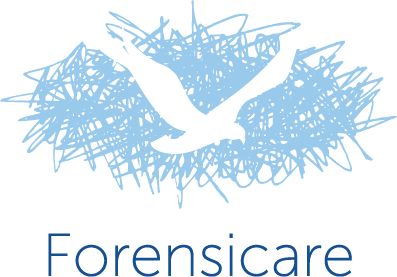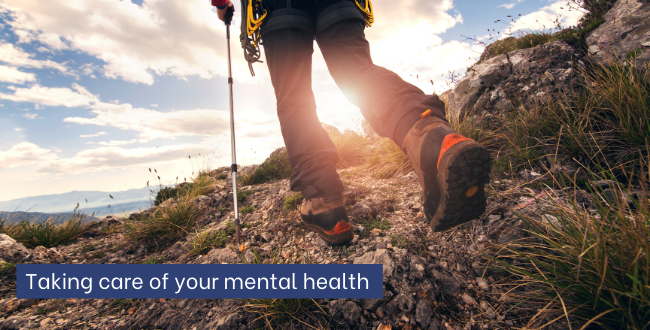Taking care of your mental health and well-being during COVID-19
It’s true: we are experiencing an unprecedented global change in the wake of the COVID-19 pandemic.
For many of us, this means change—to our daily routine, to our work environment, to our health and fitness, to the way we connect socially, and even to our family life.
It’s unsettling, particularly because this change has occurred in such a short period of time. Over what felt like a blink of the eye, we’ve had to cancel meticulously planned holidays, miss dinner parties and pub nights, and say goodbye to watching our favourite teams on the screen.
We’ve also had to sit with the unsettling discomfort that comes from the unknown. We don’t know how things will progress, and we don’t know what will keep changing in our lives.
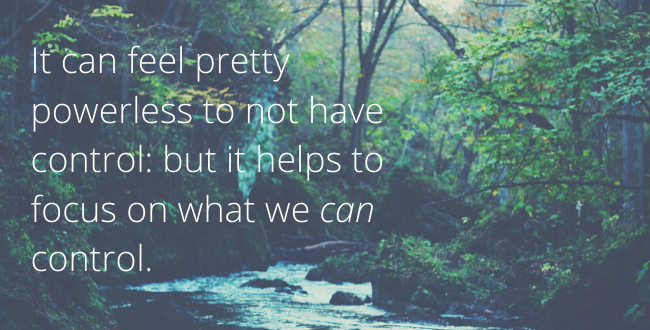
To support our staff, Principal Psychologist Dr Meera Aurora, Senior Psychologist Dr Diana Talevski, and Senior Psychologist Dr Bonnie Albrecht are sending out a regular newsletter with tips and tricks to help manage anxiety, fear and loneliness people may be experiencing, as well as ways we can adjust our lives to adapt to the changes around us.
And now, we share these resources with you.
WHAT IS HAPPENING TO ME/US/THE WORLD?!
All reactions are normal and understandable, anything goes.
Have you been feeling anxious and worried?
Like there’s just too much spinning out of control?
And like you’re only just catching up to a new change, when more change arises?
Maybe you’ve been feeling disconnected and lonely. Or maybe, you’re feeling a bit resentful. Maybe you’ve even felt a little bit scared of what might happen.
If you’ve felt any—or all—of these things, it’s important to know that this is completely normal. We’re going through a period of unprecedented change; and that is a pretty scary, daunting thing.
You probably have a bunch of self-care and well-being strategies in your repertoire, and while we encourage you to build these into your everyday routine, we understand sometimes it can all be a little overwhelming—and sometimes, you need a little reminder on practical ways to curb anxiety and stress.
Remember: this is a marathon, not a sprint. Take the time to develop and enhance your well-being, and know that genuine self-care takes time, but taking those small steps now to look after yourself will help you—and those around you—get through the months ahead.
Focus on maintaining good self-care
When we struggle with fluid situations and strong emotions, self-care can be the first thing that drops off our radar—when really, it’s the most important first step to enhancing our well-being, and improving our ability to tackle new (or ongoing) challenges.
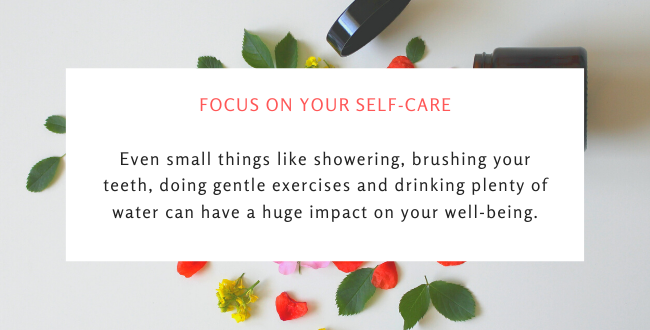
Shower daily, brush your teeth, eat healthy food, drink plenty of water. Do some gentle exercise (walk, stretch) and remember to take breaks from work. Burn your favourite candle, cook your favourite food, feng shui your living room. Change your clothes when the ‘work day’ is over (even if you’re working from home), maintain clean laundry and dishes and build in a regular sleep routine.
Focus on what you can control
When the world feels out of control, you can feel pretty powerless—but it helps to focus on what you do have control over.
Limit your time trawling various sites for COVID-19 updates. Instead, check only one or two main health update pages (like the World Health Organization or the official Australian Government update site) once or twice a day. Yes, it’s important to stay up-to-date—but flooding yourself with information from news pages and social media can quickly become overwhelming, and anxiety-provoking: so this is a really important step. And when you check these sites, make sure it’s not right before you go to sleep: these things can definitely weigh on our minds and keep us up at night.
Focus on yourself. Rather than worrying about other people not social distancing, or the empty grocery store shelves, focus on what you can do: like focusing on your own social distancing, on your own well-being, and your own safety practices.
Still feeling overwhelmed? Why not work on your personal development. Take a quick online course. Start a new hobby or activity. As a health care provider, we know the absolute importance of taking care of ourselves first.
Create a new routine
With most of us having our usual routine shattered, it is important to make a new routine—or try to re-create your normal routine as best as possible. Structure, normality and routine are widely known to help us cope through periods of uncertainty or upheaval: particularly if these periods are likely to be lengthy.
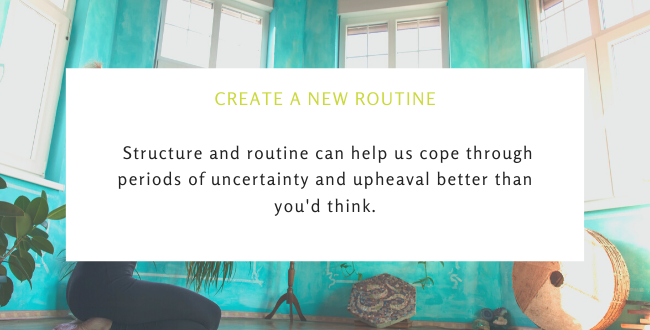
Wake up, shower, and get dressed every day like normal. Prepare your lunch. Take a lunch break, even if you’re working from home. Keep to your normal work hours as much as possible. And if you’re working from home with kids, “build-in” time with them too.
Switch up going to the gym for a run, or if you’re isolating at home, try body-weight exercises. You can find a wide range of resources online—like yoga and other exercise sessions on YouTube. You can even search the app store for your favourite activity.
Occupy yourself in a (new?!) meaningful way.
As health professionals, we know that occupying your time in a meaningful way can have a significant positive impact on psychosocial well-being. And let’s face it—if we’re limiting our social media use, we’ll have a lot more time on our hands.
Look for opportunities for fun things to do at home. Try a new recipe, read that book or listen to that podcast you’ve been meaning to for months, or try your hand at making something—like arts and craft.
Make a list of all those little jobs you’ve wanted to do, or all those hobbies you’ve wanted to start. Maybe you want to finally organise the kitchen cupboard. Either way, the world is your digital oyster.
Stay connected – Social distancing does not mean disconnection
Social distancing doesn’t mean social disconnection—and loneliness and isolation has a major impact on our mental health.
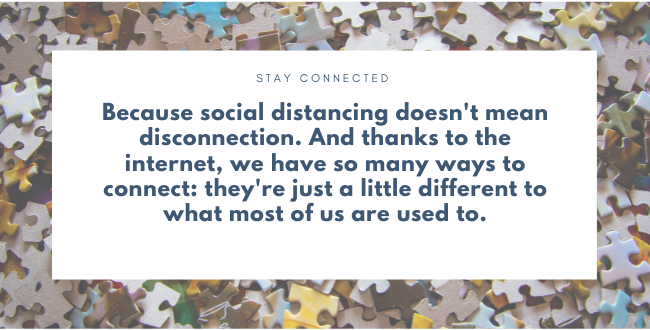
When we’re isolated, we need to make even more of an effort to remain connected with the people around us. Call your family. Chat to your co-workers on Skype or Zoom. Play games online with your friends. Why not try a virtual movie night via Netlix’s Party feature? Or a brunch date with your usual crew?
Emails, texts and messages all help too—particularly image-based apps, like Snapchat and Instagram.
We know it’s not the same. But keeping connected can have a major impact on our well-being. Thanks to the internet, we have so many opportunities to connect—they’re just in ways that are a little different than most of us are used to.
Take the time to reflect on how you’re feeling.
Reflection is good for our psychological wellbeing. It’s okay to feel sad and even grieve about missed events and missed opportunities you were really looking forward to.
In our culture, we tend to subscribe to a “first-world problems” mantra—and yes, there always are, and always will be people who are worse off. But that doesn’t make you and your feelings any less important.
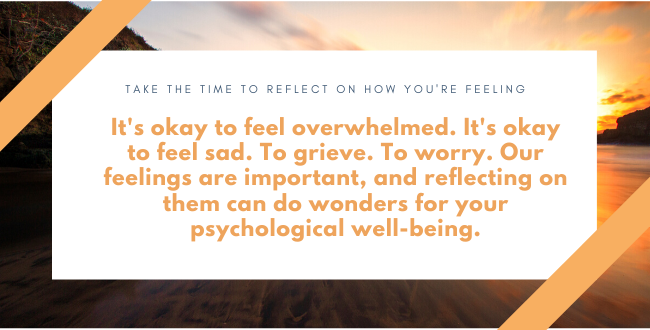
It’s important to reflect on and validate on our feelings and experiences. Talk about how your feeling. Reach out to phone and online counselling services like Lifeline. Practice mindfulness, go for a walk in nature (if you can), and don’t be afraid to talk to a close friend for support.
Keep perspective
It’s easy to get caught up in unhelpful—and often harmful—thinking patterns. Now, more than ever, we need to practice our ability to take a step back. Find some objectivity and care for yourself and those around you from a healthy place—not one fuelled by anxiety or fear.
Ask yourself:
- Am I focusing on something that’s out of my control?
- Can I use my time better to focus on what I can control?
- Am I expecting the worst to happen?
- What may be a more helpful way to think about my—or other’s—health or situation?
- What are some things that have helped me cope before?
- What is one thing I can do differently in my current situation?
It may help to reassure yourself that while we all respond to stress and anxiety in different ways, this change is impacting everyone. The principle of ‘common humanity’ (typically talked about in self-compassion literature) reminds us that suffering is a part of the shared human experience. This is true now more than ever. We are all being affected differently, but we are all affected, and so, we are not alone.
Reach out if you need support.
Lifeline: 13 14 11
Carers Australia: 1800 242 636
Kids Help Line: 1800 55 1800
This story was brought to you by the Thomas Embling Hospital Reflective Practice team, which helps our staff with their own mental health and well-being while provide care for our consumers.
This piece was written in collaboration with Principal Psychologist Dr Meera Aurora, Senior Psychologist Dr Diana Talevski, Senior Psychologist Dr Bonnie Albrecht and the Forensicare communications team.
